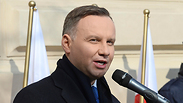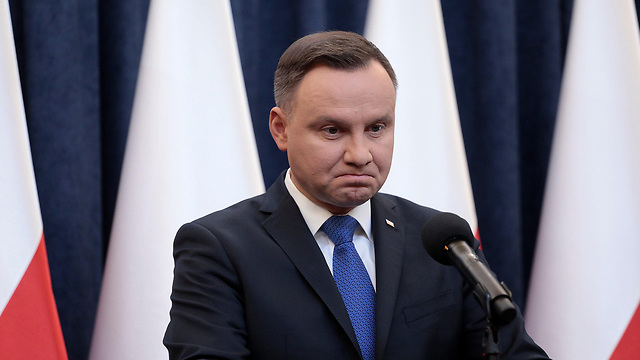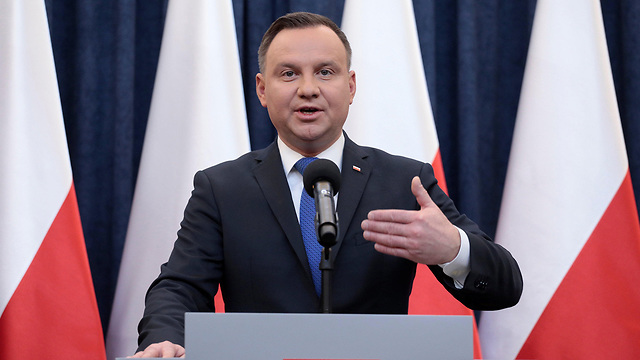
Polish president: Timing, language of Holocaust law problematic
'It was wrong that the new law was adopted on the eve of Holocaust Remembrance Day,' President Andrzej Duda says in interview with Polish newspaper, criticizing the expedited legislative process, but at the same time saying he never considered vetoing it.
WARSAW - Poland's President Andrzej Duda admitted in an interview Monday that the timing of his country's controversial Holocaust law was "wrong" and called to amend its problematic language.
"It was wrong that the (new law) was adopted (by Polish deputies) on the eve of Holocaust Remembrance Day," he told Polish newspaper Dziennik Gazeta Prawna.
Duda also noted that the expedited legislative process to pass the law surprised him. "It is difficult for me to understand what motivated legislators to act this way," he said.
The law passed by the Polish lawmakers, which Duda signed and approved but sent to the constitutional court to evaluate, outlaws blaming Poland as a nation for Holocaust crimes committed by Nazi Germany. The legislation calls for prison terms of up to three years for falsely attributing the crimes of Nazi Germany to Poland.
The Polish president, a lawyer himself, criticized the unspecific, general language of the legislation and explained he expected the constitutional court to fix the faults in it, and mostly specify that the law focuses on "acts committed with criminal intention."
He didn't rule out submitting a proposal to amend the law's language himself, stressing that regardless the law was a matter of Polish sovereignty and that "no one from abroad can dictate to us whether Poles are allowed to defend themselves against slandering."
Duda said he spoke to Israeli officials about the controversial law when he visited the country a year ago. "I promised that I would strive to exclude artistic and research activity from this law," he said, noting this seemed to have been enough. "I was not asked anything else about this matter. I had the impression that the law doesn't raise reservations in Israel, except for these two problems. That's why I was surprised by the scale of the Israeli attack, because these two exclusions were introduced into the act."
Asked if he had doubts about signing the bill into law, Duda said he did not consider vetoing the bill. "It is not a clamor that decides whether or not given legislation is signed," he said.
At the same time, he did admit there were many Poles who turned Jews in to the Nazis, asserting that "In such times, people who commit crimes can be found in every nation. But please do not say that the crime was committed by the Polish nation. The Polish nation fought against the Germans."
The Polish president also took issue with the answer Poland's Prime Minister Mateusz Morawiecki gave Yedioth Ahronoth journalist Ronen Bergman at the Munich Security Conference, when he said there were also "Jewish perpetrators" in the Holocaust.
Duda said he found the statement "uncomfortable," but at the same time defended Morawiecki, saying "I am sure that the prime minister had no intention of offending anyone's sensitivity."
The legislation continues to dominate public discourse in Poland. On Sunday, more than 100 civil society organizations in Poland released a letter to “international public opinion” and mostly to "our friends the Jews" against the Holocaust law. The letter was read out in Polish, Hebrew and English at a rally attended by hundreds of Poles.
"Know that we are here, and together with us are millions of Poles who think and feel as we do—objecting to the obscene and absurd law the parliament passed, objecting to a false rewriting of history done by the current government, and calling out: 'Not in our name!'" the letter read.
The rally was held at the Gdanski train station, the departure point for some 14,000 Poles of Jewish descent who were forced to leave the country in a March 1968 purge by the communist regime of the time. Participants held up signs saying "We're all Jews" and "Just the truth, and the entire truth."
In recent days, opposition to the law has been increasing in Polish public opinion, and the demand to change or nix it has also been coming from influential circles within the ruling Law and Justice party.













